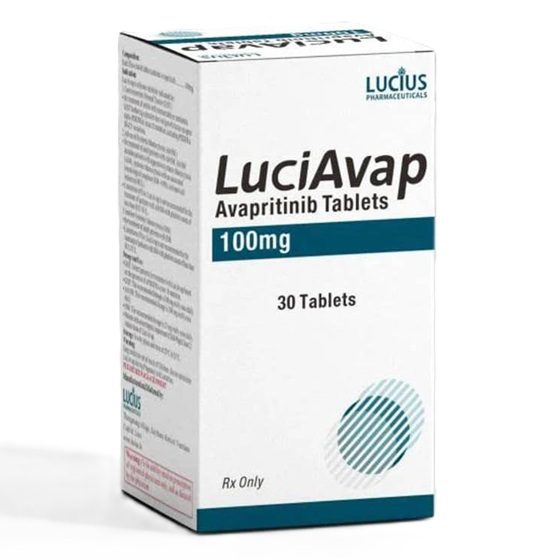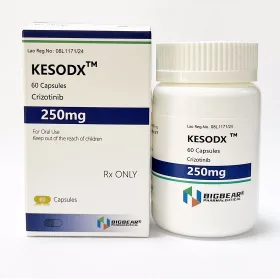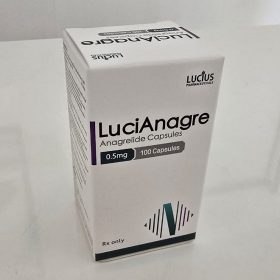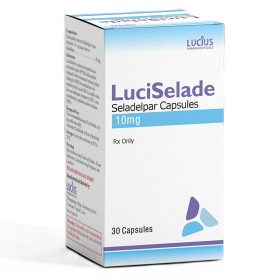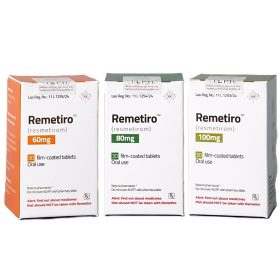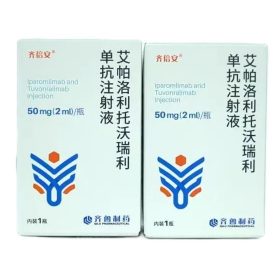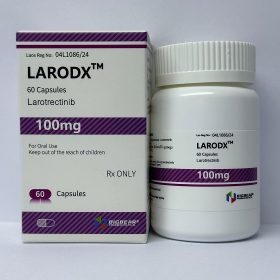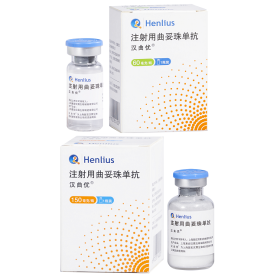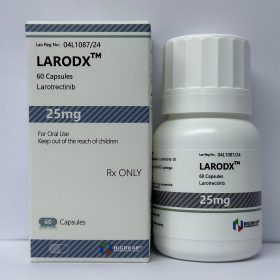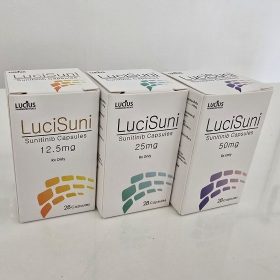- Details
- Description
-
Packaging Size30tabs
-
Strength100mg
-
CompositonAvapritinib
-
Treatmentgastrointestinal stromal tumor (GIST), Advanced systemic mastocytosis (AdvSM),Indolent systemic mastocytosis (ISM)
-
Formtablet
-
BrandLuciAvap
-
Quantity Unit100,g*30t/box
-
ManufacturerLucius Pharmaceuticals (Lao) Co.,Ltd
About Avapritinib
Avapritinib is a medication used for the treatment with:
- A certain type of stomach, bowel, or esophagus cancer called gastrointestinal stromal tumor (GIST) that cannot be treated with surgery or that has spread to other parts of the body (metastatic), and that is caused by certain abnormal platelet-derived growth factor receptor alpha (PDGFRA) genes.
- Advanced systemic mastocytosis (AdvSM), including aggressive systemic mastocytosis (ASM), systemic mastocytosis with an associated hematological neoplasm (SM-AHN), and mast cell leukemia (MCL).
- Indolent systemic mastocytosis (ISM). Avapritinib is not recommended in people with low platelet counts (less than 50 X 109/L).
Gastrointestinal Stromal Tumors
Indicated for adults with unresectable or metastatic gastrointestinal stromal tumor (GIST) harboring a platelet-derived growth factor receptor alpha (PDGFRA) exon 18 mutation, including PDGFRA D842V mutation
300 mg PO qDay
Continue until disease progression or unacceptable toxicity
Systemic Mastocytosis
Indicated for advanced systemic mastocytosis (AdvSM)
AdvSM includes patients with aggressive systemic mastocytosis (ASM), systemic mastocytosis with an associated hematological neoplasm (SMAHN), and mast cell leukemia (MCL)
200 mg PO qDay
Continue until disease progression or unacceptable toxicity
Indolent Systemic Mastocytosis
Indicated for indolent systemic mastocytosis (ISM)
25 mg PO qDay
Dosage Modifications
Dose reductions for adverse reactions
-
GIST
- First dose reduction: 200 mg qDay
- Second dose reduction: 100 mg qDay
- Unable to tolerate a 100-mg dose: Permanently discontinue
-
AdvSM
- First dose reduction: 100 mg qDay
- Second dose reduction: 50 mg qDay
- Third dose reduction: 25 mg qDay
- Unable to tolerate a 25-mg dose: Permanently discontinue
Intracranial hemorrhage
- First occurrence of Grade 1 or 2: Withhold until resolution; resume at reduced dose
- Subsequent occurrence of Grade 1 or 2: Permanently discontinue
- Grade 3 or 4: Permanently discontinue
CNS effects
- Grade 1: Continue dose at the same dose or withhold until improvement to baseline or resolution; resume at same dose or reduced dose
- Grade 2 or 3: Withhold until improvement to baseline, Grade 1, or resolution; resume at same dose or reduced dose
- Grade 4: Permanently discontinue
Other adverse reactions
- Grade 3 or 4: Withhold until improvement to Grade ≤2, or resolution; resume at same dose or reduced dose, as clinically appropriate
Thrombocytopenia
- Platelet counts <50 x 109/L: Interrupt until platelet count ≥50 x 109/L, then resume at reduced dose
- If platelet counts do not recover above 50 x 109/L, consider platelet support
Strong or moderate CYP3A4 inhibitors
- Avoid coadministration
-
- GIST: 100 mg PO qDay
- AdvSM: 50 mg PO qDay
- ISM: Avoid coadministration
Renal impairment
- Mild-to-moderate (CrCl 30-90 mL/mL): No dosage adjustment necessary
- Severe or end-stage renal disease (CrCl <30 mL/min): Effect on pharmacokinetics unknown
Hepatic impairment
- Mild [total bilirubin ≤ upper limit of normal (ULN) and aspartate aminotransferase (AST) > ULN or total bilirubin > 1 to 1.5 times ULN and any AST or moderate [total bilirubin >1.5 to 3 times ULN and any AST] hepatic impairment: No dosage adjustment necessary
-
Severe (Child-Pugh C)
- Reduce starting dose
- GIST: 200 mg PO qDay
- AdvSM: 100 mg PO qDay
- SIM: 25 mg PO every other day

